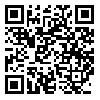Volume 5, Issue 1 (4-2019)
RSJ 2019, 5(1): 297-306 |
Back to browse issues page
Download citation:
BibTeX | RIS | EndNote | Medlars | ProCite | Reference Manager | RefWorks
Send citation to:



BibTeX | RIS | EndNote | Medlars | ProCite | Reference Manager | RefWorks
Send citation to:
Ebadi Fard Azar F, Safari H. Organizational Resilience of Hospitals in Facing Crises: a conceptual and strategic review. RSJ 2019; 5 (1) : 22
URL: http://rsj.iums.ac.ir/article-1-224-en.html
URL: http://rsj.iums.ac.ir/article-1-224-en.html
Health Promotion Research Center, Iran University of Medical Sciences, Tehran, Iran
Abstract: (383 Views)
Background & Objectives: Given the increasing frequency of environmental, biological, technological, and social crises in recent decades, hospitals as the primary responsive institutions in health systems require the ability to adapt and rapidly recover during crises. Organizational resilience is recognized as a key capacity in this regard. This article aims to provide a conceptual and analytical review of organizational resilience in hospitals, identify its dimensions and influencing factors, and examine global frameworks and experiences.
Materials & Methods: This study was conducted as a narrative review. Scientific databases including PubMed, Scopus, Google Scholar, SID, and Magiran were searched for the period 2010 to 2024. Keywords such as “organizational resilience,” “crisis management,” “hospital,” and their English equivalents were used. After initial screening, 45 credible sources were selected for conceptual analysis.
Results: The analysis revealed that organizational resilience in hospitals is a multidimensional construct encompassing dimensions such as flexible leadership and governance, trained human resources, technological infrastructure, agile organizational structure, a learning culture, and inter-organizational collaboration. Models such as the Hospital Safety Index (WHO) and frameworks based on adaptive capacity have been recognized as effective resilience assessment tools. International experiences (e.g., Japan, Italy, and Iran during the COVID-19 crisis) emphasize the critical role of flexible management, technology, and organizational networking.
Conclusion: Enhancing organizational resilience in hospitals requires the design of strategies based on education, technology, proactive policymaking, and leveraging successful global models. It is recommended that a localized hospital resilience framework be developed for Iran, considering the country’s cultural, economic, and structural contexts.
Materials & Methods: This study was conducted as a narrative review. Scientific databases including PubMed, Scopus, Google Scholar, SID, and Magiran were searched for the period 2010 to 2024. Keywords such as “organizational resilience,” “crisis management,” “hospital,” and their English equivalents were used. After initial screening, 45 credible sources were selected for conceptual analysis.
Results: The analysis revealed that organizational resilience in hospitals is a multidimensional construct encompassing dimensions such as flexible leadership and governance, trained human resources, technological infrastructure, agile organizational structure, a learning culture, and inter-organizational collaboration. Models such as the Hospital Safety Index (WHO) and frameworks based on adaptive capacity have been recognized as effective resilience assessment tools. International experiences (e.g., Japan, Italy, and Iran during the COVID-19 crisis) emphasize the critical role of flexible management, technology, and organizational networking.
Conclusion: Enhancing organizational resilience in hospitals requires the design of strategies based on education, technology, proactive policymaking, and leveraging successful global models. It is recommended that a localized hospital resilience framework be developed for Iran, considering the country’s cultural, economic, and structural contexts.
Article number: 22
Keywords: Hospital Administration/The Resilience Scale, Hospitals, Crisis Intervention, Health Services Administration, Disaster Planning
Type of Study: Research |
Subject:
Special
Received: 2025/08/31 | Accepted: 2025/09/24 | Published: 2025/09/29
Received: 2025/08/31 | Accepted: 2025/09/24 | Published: 2025/09/29
Send email to the article author
| Rights and permissions | |
 |
This work is licensed under a Creative Commons Attribution-NonCommercial 4.0 International License. |






